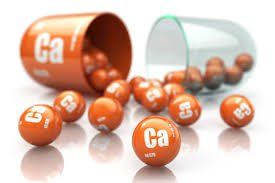This is an automatically translated article.
This article is professionally consulted by Master, Doctor Nguyen Nhu Thu Truc - Obstetrician and Gynecologist - Department of Obstetrics and Gynecology - Vinmec Nha Trang International General Hospital. Doctor has more than 8 years of experience in the field of Obstetrics and Gynecology.Calcium is one of the essential minerals of the body, especially for pregnant women. During pregnancy, a woman's body lacks a huge amount of calcium. If not supplemented with the necessary amount of calcium, it will not only affect the health of the pregnant woman but also adversely affect the normal development of the fetus.
1. The role of calcium during pregnancy
Pregnant women need calcium supplements to provide for the fetus, helping the baby's bone, skull, teeth, and muscle formation. Pregnant mothers with calcium deficiency often have symptoms such as:Fatigue, back pain, joint pain, toothache, tooth decay, leg cramps, Insomnia, Calcium deficiency in pregnant women also affects fetal health such as:
Slow growth Congenital rickets Congenital wheezing Bone malformations Some of the roles of calcium for pregnant women include:
Provide for the baby's development, help the baby develop a comprehensive and healthy skeletal system. Participating in the regulation of blood clotting, facilitating natural blood clotting. Protect mother against osteoporosis, spongy bones, weak bones easily broken due to calcium deficiency. Maintain a stable heart rate and metabolic activities in the body. It is an essential ingredient for the production of breast milk after giving birth. Reduce the risk of preeclampsia in pregnant women, prevent high blood pressure.
Trắc nghiệm: Bổ sung canxi sau sinh cho sản phụ như thế nào?
Bổ sung canxi sau sinh cho sản phụ là việc làm vô cùng cần thiết, đặc biệt với những người nuôi con bằng sữa mẹ hoàn toàn. Trường hợp mẹ sau sinh không bổ sung canxi hoặc bổ sung không đúng cách sẽ ảnh hưởng rất nhiều đến sức khỏe của mẹ và sự phát triển toàn diện của bé. Bài trắc nghiệm dưới đây sẽ giúp mọi người hiểu hơn về tầm quan trọng của việc bổ sung canxi sau sinh cho sản phụ và bổ sung thế nào cho đúng cách, an toàn.2. What is the calcium requirement during pregnancy?
Calcium requirements during pregnancy increase markedly with gestational age. In the first 3 months, pregnant women need 800mg of calcium, 1000mg in the second 3 months and 1500mg in the last 3 months.Lactating women need to be supplemented with calcium after birth with the same amount as the last 3 months of pregnancy because the baby's nutrients are provided from breast milk. If the mother is deficient in calcium, the child will also be deficient in this mineral.

Pregnant women must not only eat a lot of calcium-containing foods, but also need to supplement calcium with drugs. Should use calcium containing vitamin D3 to increase absorption.
Do not arbitrarily supplement calcium but need to perform tests to assess the level of calcium deficiency of the body first, from which the doctor will advise the type of calcium, the calcium dosage suitable for the pregnant woman. Avoid excess calcium supplements can lead to bad effects on the stomach, kidneys...
3. How many months pregnant should take calcium?
Pregnant women's calcium needs increase in the second trimester of pregnancy, especially the last three months due to the rapid growth of the fetus. If there is not enough calcium, the fetus will "withdraw" calcium from the mother's body to serve the process of bone and skull formation.As mentioned, in the second 3 months of pregnancy, the calcium requirement of pregnant women is 1200mg/day and increases to 1500mg/day in the last 3 months. Therefore, usually, pregnant women until the 4th month of pregnancy should start taking calcium to provide enough calcium needed for both mother and baby.
Calcium supplements for pregnant women are very important and necessary. However, do not arbitrarily supplement because if the body cannot absorb all of the calcium that is ingested, some will be excreted out, which can increase pressure on the stomach and urinary system.
The excess of calcium also adversely affects the fetus. Pregnant women need to perform a blood test to determine the current calcium level of the body, from which to make a conclusion whether to take calcium or not, calcium supplements with how much is enough.
4. Notes when taking calcium during pregnancy
Take calcium according to the correct dosage, as prescribed by the doctor. Do not arbitrarily take too much, which can lead to an excess of calcium. Add a lot of vitamin C to help the body easily absorb calcium. Do not take calcium with iron. Should be taken about 2 hours apart because calcium can reduce the body's ability to absorb iron Should drink calcium in the morning, about 1 hour after breakfast, should not be taken in the evening because it is easy to cause insomnia, sediment sediment causes kidney stones. Pregnant women with cardiovascular disease, diabetes... should be careful when using calcium. Absolutely follow the instructions and recommendations of the doctor. Healthy pregnant women with no history of disease or allergies can use most types of calcium supplements, but still recommend supplementing at a reasonable dose. . Pregnant women who are obese or have diabetes should limit calcium supplements containing sugar. Pregnant women at risk of preeclampsia and high blood pressure should limit calcium supplements containing sodium salts. The body can only absorb about 500 mg of calcium in a single supplement, so it should be divided into several times a day for good results. Do not drink calcium in combination with foods such as chocolate, cocoa, green tea, ..5. Foods rich in calcium for pregnant women

Milk, dairy products: can drink fresh milk or pregnant milk, cheese, yogurt .. Beef: beef is a source of Provides iron, contains a lot of calcium, very good for pregnant women Chicken, duck, chicken eggs, duck eggs Shellfish: Shrimp, crab, crab, shellfish, clams, mussels.. Fruits such as: banana, kiwi, citrus are fruits with many vitamins and minerals that are good for the health of mothers and babies. Green vegetables such as: spinach, broccoli, kale, spinach, .. are vegetables rich in calcium and vitamins and minerals. Pregnant women need periodic antenatal check-ups at hospitals with sufficient expertise and modern technological equipment to be able to closely monitor the developments of the fetus's development and recognize the nutritional deficiencies of the fetus. from which to advise pregnant women what to supplement, with how much dosage to keep both mother and child healthy.
It is also one of the contents implemented in the Maternity Care Package of Vinmec International General Hospital. In addition to nutritional advice, Vinmec's experts also perform many other examination and diagnosis methods to help detect abnormal signs at the earliest for timely intervention, ensuring a safe, convenient pregnancy and healthy pregnancy. The most comfortable for mother and baby.
Please dial HOTLINE for more information or register for an appointment HERE. Download MyVinmec app to make appointments faster and to manage your bookings easily.














